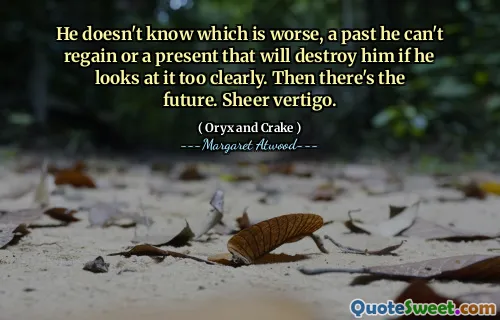Female artists are biologically confused, said Crake.
In Margaret Atwood's novel "Oryx and Crake," the character Crake expresses a controversial view on female artists, suggesting that they are "biologically confused." This statement reflects Crake's larger beliefs about gender and creativity, indicating a disconnect between biological identity and artistic expression. His perspective raises questions about societal norms and the roles that gender plays in the arts. Atwood uses Crake's character to explore deeper themes of identity and the nature of creativity. The notion of being "biologically confused" hints at the struggles individuals face when their innate desires and talents clash with societal expectations. Through this lens, Atwood critiques a world that tries to categorize people strictly based on their biology, revealing the complex interplay between gender and art in a dystopian setting.
In Margaret Atwood's novel "Oryx and Crake," the character Crake expresses a controversial view on female artists, suggesting that they are "biologically confused." This statement reflects Crake's larger beliefs about gender and creativity, indicating a disconnect between biological identity and artistic expression. His perspective raises questions about societal norms and the roles that gender plays in the arts.
Atwood uses Crake's character to explore deeper themes of identity and the nature of creativity. The notion of being "biologically confused" hints at the struggles individuals face when their innate desires and talents clash with societal expectations. Through this lens, Atwood critiques a world that tries to categorize people strictly based on their biology, revealing the complex interplay between gender and art in a dystopian setting.






